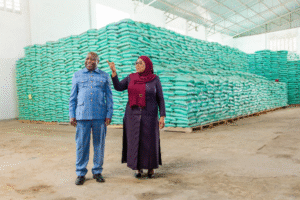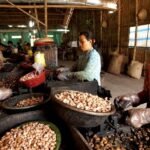By Zablon Oyugi, July 11,2025-The International Maize and Wheat Improvement Center CIMMYT in collaboration with the Kenya Plant Health Inspectorate Service (KEPHIS) and the Kenya Agricultural and Livestock Research Organization (KALRO) has developed the Maize Seed Tracker—a digital decision support tool to combat Maize Lethal Necrosis (MLN) disease and support production of MLN‑free seed.
Built on the Open Data Kit (ODK) platform, the Maize Seed Tracker (MST) is a mobile and web‑based application that functions both online and offline, enabling GPS‑tagged, time‑series data collection on farm history, disease scouting, surveillance observations and post‑harvest assessments. Data synchronizes securely in real time with regulators and stakeholders for timely oversight.
Since MLN was first detected in Kenya in 2011, the disease has devastated maize yields across eastern Africa, especially where maize is a staple in both diet and rural economies.
In response, this partnership created MST to bring real‑time, data‑driven decision‑making to seed producers and regulators, strengthening traceability and early detection of MLN – critical for minimizing seed rejection, reducing production losses, and improving profitability of seed enterprises.
The MST supports adherence to Standard Operating Procedures (SOPs) for MLN‑free seed production and provides proactive risk assessments that help growers select low‑risk production sites and apply timely interventions.
By enabling traceability, MST facilitates early disease detection and effective disease management, significantly reducing risks across the value chain.
To accelerate uptake, CIMMYT, KEPHIS and KALRO delivered capacity‑building trainings in December 2024. The first session on December 3 in Marigat, Baringo County hosted 112 participants, including seed company staff, agricultural officers and scientists.
A second session on December 4 in Weiwei, West Pokot engaged 92 participants from nearby irrigation schemes. Participants received hands‑on instruction in using MST, identifying MLN symptoms, and applying quality seed production practices.
They acknowledged MST’s value in enhancing disease management and emphasized the importance of practical demonstrations, particularly for growers without smartphones or digital access.
Suresh L.M., maize pathologist at CIMMYT, underscores the tool’s value: “The digital decision support tool to enable MLN‑free commercial seed production is a key step to support seed producers, seed growers, and regulators in timely monitoring of MLN and reducing risk.” This statement emphasizes how MST bridges the needs of producers and regulators alike.
MST forms a central component of a broader Plant Health Initiative aimed at building resilient, disease‑free maize seed systems. The tool’s delivery of geo‑referenced, real‑time data facilitates collaboration across farmers, seed companies and regulatory authorities.
In doing so, it streamlines seed certification processes, enhances traceability and promotes timely decision‑making throughout the seed value chain.
Participants in the trainings expressed strong optimism about MST’s ability to curb MLN spread and restore confidence in seed quality. As adoption grows among farmers, institutions and regulators, Kenya’s maize seed sector looks set to become more transparent, coordinated and resilient to disease.
In summary, MST exemplifies how digital innovation can offer transformative solutions to agricultural threats. CIMMYT, KEPHIS and KALRO’s joint effort develops more than an app—it delivers a platform to safeguard seed systems, protect livelihoods, and secure the maize staple across the region.







